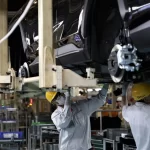
April 2025 marks a turning point as domestic car sales rise despite ongoing production and export challenges, with EVs and motor show promotions helping drive momentum.
After nearly two years of consecutive declines, Thailand’s automotive industry has finally turned a corner. Domestic car sales in April 2025 rose by 0.97% year-on-year, according to the Federation of Thai Industries (FTI), marking the first positive growth in 23 months. This modest but symbolic increase reflects a broader shift in market dynamics, driven in part by strong demand for electric vehicles (EVs) and aggressive promotional campaigns during recent auto shows.
EVs Charge Ahead
One of the key contributors to the recent sales bump has been the rising popularity of EVs. Consumers across Thailand are increasingly turning to battery electric vehicles (BEVs) as awareness grows around environmental sustainability, lower operating costs, and government-backed incentives. According to the FTI, BEV production surged by over 60% year-on-year in February, and the momentum continued into April as major automakers reported growing orders for their electric lineups.
Brands such as BYD, MG, and Great Wall Motors have capitalized on this trend by launching affordable EV models tailored to the Thai market. Their strong presence at the Bangkok International Motor Show in March and other promotional events throughout April created significant consumer buzz and contributed to increased showroom traffic.
EVs, once seen as niche products, are now becoming a mainstream choice, helping offset slumping sales in more traditional vehicle segments like pickup trucks. This shift has played a crucial role in nudging the overall sales figure into positive territory.
Motor Shows and Promotions Spark Consumer Interest
Another major factor behind the April sales growth was the series of nationwide promotional campaigns tied to the 2025 Bangkok International Motor Show and other regional exhibitions. Held from March 27 to April 7, the Motor Show featured exclusive deals, zero-interest financing packages, cash rebates, and extended warranties, which incentivized consumers to make purchasing decisions.
Automakers and dealers alike reported a spike in foot traffic and inquiries during and immediately following the show. Many used the momentum to roll out limited-time promotions that extended into April, helping to convert interest into actual sales.
Surapong Paisitpattanapong, spokesperson for the FTI’s automotive industry division, confirmed that these efforts significantly influenced buying behavior: “We observed strong engagement from first-time car buyers and EV enthusiasts, especially those looking to take advantage of exclusive show-time incentives.”
A Market Still Facing Headwinds
While the uptick in sales is encouraging, Thailand’s auto industry is not yet out of the woods. Vehicle production in April fell by 0.4% year-on-year to 104,250 units, marking the 21st consecutive month of decline. The commercial vehicle segment, particularly pickup trucks, remains sluggish, weighed down by strict lending criteria and high rejection rates for auto loans.
Exports also remain under pressure, declining 6.31% year-on-year in April. Though this was an improvement over March’s 14.91% drop, it underscores ongoing challenges in global demand and supply chain volatility.
High household debt and cautious consumer sentiment continue to affect vehicle financing, with banks tightening credit approvals in response to rising non-performing loans. These constraints have especially impacted lower-income buyers and rural small business owners, many of whom rely on pickup trucks for work.
Government Support and Industry Optimism
In response to these challenges, the Thai government and key industry players are collaborating to stimulate demand. Programs such as the “Big Brother’s Loan Guarantee” scheme aim to support pickup truck buyers by backing vehicle loans for small businesses and farmers.
Meanwhile, EVs continue to receive strong government support through tax incentives, subsidies, and infrastructure development. Charging stations are expanding across urban and semi-urban areas, making EV adoption more feasible for a broader segment of the population.
Industry executives remain cautiously optimistic. “The sales increase in April is a positive signal,” said Pongsak Lertrudeewattanavong, Vice President of MG Motor Thailand. “We are seeing the benefits of strong marketing, policy alignment, and changing consumer preferences — especially towards EVs.”
A Glimpse of the Road Ahead
The 0.97% rise in domestic car sales may seem modest on the surface, but for an industry that has been in reverse for nearly two years, it’s a significant milestone. With the combination of strong EV momentum, government support, and strategic promotional efforts, Thailand’s automotive sector appears to be slowly regaining traction.
Looking forward, continued focus on sustainable mobility, financial accessibility, and export resilience will be critical to sustaining this recovery. For now, April 2025 marks a much-needed turning point — one driven not only by numbers, but by innovation, adaptability, and a renewed confidence in the road ahead.


